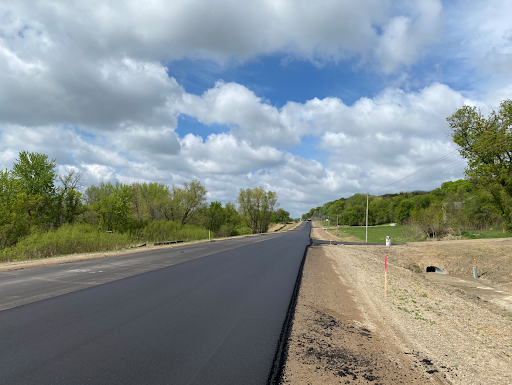Hot Mix Asphalt Paving: The Secret to Smooth, Angled Parking Lot Surface Areas
Hot Mix Asphalt Paving: The Secret to Smooth, Angled Parking Lot Surface Areas
Blog Article
Discovering the Environmental Benefits of Hot Mix Asphalt
The utilization of Warm Mix Asphalt in facilities projects presents a compelling case for lasting development and ecological stewardship. By diving right into the complex details of its production procedures and the ingenious use of recycled products, a much deeper understanding emerges of how this modern technology goes past mere surface area applications. The environmental benefits of Warm Mix Asphalt extend much beyond first impacts, using a nuanced perspective on just how this material can lead the way for a greener future.

Lowered Greenhouse Gas Emissions
The manufacturing procedure of Hot Mix Asphalt involves heating the mixture of aggregate and asphalt binder to high temperature levels. By including recovered asphalt sidewalk and recycled asphalt roof shingles into the mix, the requirement for virgin materials is reduced, leading to power cost savings and reduced emissions associated with extraction and handling.
Research studies have revealed that Hot Mix Asphalt pavements have a smaller sized carbon impact over their life cycle contrasted to various other pavement alternatives. The sturdiness and recyclability of Hot Mix Asphalt better enhance its ecological advantages by decreasing the requirement for frequent upkeep or substitute, thereby preserving resources and reducing exhausts connected with repair activities.
Power Effectiveness and Preservation
The production procedure of Hot Mix Asphalt not just reduces greenhouse gas exhausts yet also contributes substantially to power efficiency and preservation efforts. Power performance is a key advantage of Hot Mix Asphalt production compared to other sidewalk types. The resilience of Warm Mix Asphalt decreases the frequency of upkeep and repair, leading to long-term power financial savings.
Lasting Sidewalk Solutions

One trick element of lasting pavement services is making use of recycled products such as reclaimed asphalt sidewalk (RAP) and recycled asphalt roof shingles (RAS) By incorporating these products into the asphalt combinations, the demand for virgin resources is lowered, resulting in lower power consumption and greenhouse gas discharges throughout manufacturing. In addition, the reuse of these materials helps draw away waste from landfills, adding to a more round and sustainable economic situation.
Furthermore, sustainable pavement options concentrate on maximizing pavement layout to boost efficiency and durability. Methods such as cozy mix asphalt (WMA) and stone mastic asphalt (SMA) improve the resilience and durability of sidewalks, lowering the demand for regular repairs and substitutes. By applying these cutting-edge approaches, facilities programmers can create pavements that not just satisfy high-performance standards but likewise decrease their ecological impact.
Minimized Environmental Effect
Warm mix asphalt, in certain, offers numerous benefits that add to reducing the total environmental impact of roadway facilities. One crucial facet is the recyclability of asphalt, which can be recycled numerous times without endangering its top quality - Regrading.
In addition, the manufacturing of hot mix asphalt discharges lower degrees of greenhouse gases compared to other pavement materials, making it an extra environmentally friendly alternative. The power effectiveness of asphalt plants has additionally improved throughout the years, causing reduced fuel intake and lower emissions. Additionally, the smooth surface of hot mix asphalt decreases rolling resistance for vehicles, leading to lower gas usage and lowered air contamination from automobile exhausts.
Payment to Climate Adjustment Mitigation
Hot mix asphalt plays a vital duty in mitigating environment modification with its lasting residential properties and minimized ecological effect. One considerable contribution to climate change mitigation originates from the power performance of warm mix asphalt production. Compared to various other sidewalk choices, the manufacturing process for warm mix asphalt takes in less energy and produces lower degrees of greenhouse gases, hence lowering its general carbon footprint.
Furthermore, hot mix asphalt's ability to reflect sunshine, called albedo, helps in reducing city warm island effects. By lessening warmth absorption and retention, warm mix asphalt pavements can reduce the demand for air conditioning in urban locations, consequently lowering greenhouse gas emissions linked with energy usage for cooling functions.
Additionally, the sturdiness and i was reading this recyclability of warm mix asphalt additionally boost its environment adjustment reduction abilities. Regrading. The lengthy life expectancy of asphalt sidewalks decreases the need for constant fixings or replacements, eventually decreasing the carbon discharges linked to road upkeep tasks. In addition, the recyclability of asphalt materials decreases the need for virgin resources and lowers the ecological read what he said impact of sidewalk construction, lining up with lasting practices for climate modification mitigation.
Verdict
To conclude, the environmental benefits of Warm Mix Asphalt show its considerable contribution to reducing greenhouse gas emissions, conserving power, and minimizing environmental influence. This sustainable sidewalk service aligns with environment modification reduction initiatives, advertises resource conservation, and improves facilities advancement. By making use of recycled products, energy-efficient production procedures, and durable design, Warm Mix Asphalt plays a critical duty in cultivating a much more eco-friendly method to infrastructure building.
The production procedure of Warm Mix Asphalt involves warming the mix of aggregate and asphalt binder to high temperature levels. By incorporating recovered asphalt sidewalk and recycled asphalt roof shingles into the mix, the requirement for virgin materials is minimized, leading to energy cost savings and reduced discharges connected with extraction and processing.
One key aspect of lasting sidewalk solutions is the usage of recycled products such as redeemed asphalt pavement (RAP) and recycled asphalt roof shingles (RAS) Methods such as cozy mix asphalt (WMA) and rock mastic asphalt (SMA) enhance the sturdiness and durability of pavements, reducing the demand for constant repair services and substitutes. Contrasted to other pavement alternatives, the production process for warm mix asphalt eats less energy and releases lower levels of greenhouse gases, click this site hence minimizing its total carbon footprint.
Report this page